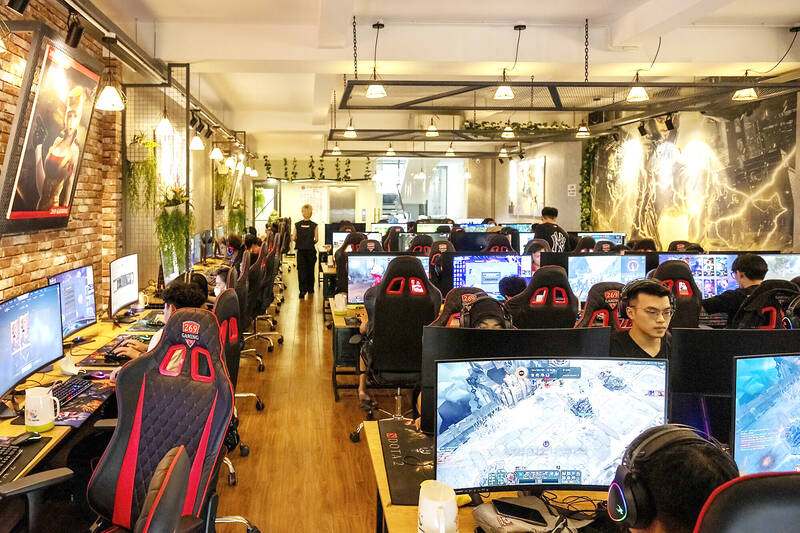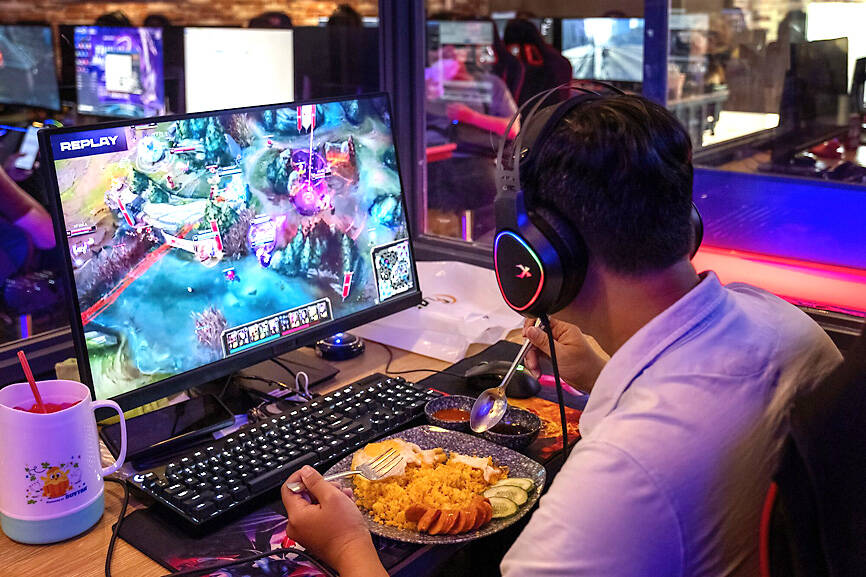Not long ago, Vietnam’s government warned parents that too many video games could lead children to a life of crime — even murder.
However, when the first-ever Vietnam GameVerse Day was held in Ho Chi Minh City earlier this year, government officials were front and center promoting the country as the region’s hottest market for game development.
Hanoi now views mobile games as an export asset and a crucial part of its emerging technology sector, as it seeks to shift beyond being a center for outsourced software and sneaker factories. The change is also an acknowledgment of the industry’s economic potential: The global mobile gaming market is estimated to exceed US$300 billion next year, with an annual growth rate of more than 7 percent in the coming years.

Photo: Bloomberg
The country ranked among the world’s top five in mobile game production by downloads in the first half of this year, according to analytics firm data.ai.
While Vietnam is one of the five communist-ruled countries in the world, the gaming industry’s rise is not too much of a surprise for those who have seen the economy firsthand. Smartphone penetration is among the highest in Asia and about half of its population is younger than 30.
Hustling and competing is part of everyday life in Vietnamese cities, where street vendors line congested streets selling noodle dishes and ice coffees while tech entrepreneurs make elevator pitches at networking events.

Photo: Bloomberg
The local gaming industry is led by a growing cadre of game developers and publishing start-ups including Amanotes Pte Ltd, known for its mobile music games, and Falcon Squad publisher OneSoft Global Pte Ltd.
Their rise also reflects Vietnam’s success at bolstering its education system. Vietnamese students regularly outperform counterparts in the US and other Organisation for Economic Co-operation and Development countries on Programme for International Student Assessment test scores, and interest in engineering and technology runs high. Coding camps for children are increasingly popular, while universities include game development in curricula.
“There is that Silicon Valley go-out-and-get-it spirit in Ho Chi Minh City,” said Khoi Nguyen, founder of Good Story Time, a start-up creating tools for video game development.
He relocated to Vietnam from the San Francisco Bay Area after working as a lead engineer for Oculus VR Inc, acquired by Meta Platforms Inc in 2014.
“The engineering talent is pretty top notch,” he said.
Vietnam first caught the attention of global gamers in 2013 after Hanoi developer Dong Nguyen created a simple, but addictive, game called Flappy Bird that became a sensation. It was so popular that Dong, reportedly disconcerted by the sudden attention, took it down — but not before earning as much as US$50,000 a day from pop-up advertisements.
Flappy Bird provided a jolt to Vietnamese developers, who saw how successful such simple mobile games, widely known as casual games, could be.
Thai Thanh Liem, chief executive officer of game publisher Topebox Co and part of the new generation of successful gaming entrepreneurs, recalled the excitement of those early days a decade ago. He and his friends, who would later become cofounders of the company, worked tirelessly on free-to-play games that would later be downloaded on smartphones from Singapore to San Francisco.
“We would eat, sleep and work together on the rooftop,” he said, looking back on nights huddled over laptops on a small roof — Vietnam’s version of a Silicon Valley garage.
Their first game, within a year, achieved half a million downloads and US$1 million in global revenue. Bigger hits followed.
Sky Dancer, a parkour-style game in which characters bounce off cliffs and floating islands, is published in China by TikTok Inc’s parent company ByteDance Ltd, and has been downloaded at least 50 million times.
Game studios now dot the country, competing to create the next global blockbuster. Amanotes’ Magic Tiles 3 ranked among the 20 top mobile games in global downloads last year, according to Sensor Tower Inc, which provides market research on mobile apps and digital advertising.
Amanotes said the game has been downloaded more than 1 billion times since its release in 2017.
OneSoft was last year the world’s fourth-largest mobile game publisher by downloads from the App Store and Google Play, data.ai said, while Zego Studio ranked ninth among app and games publishers worldwide in terms of downloads in the fourth quarter last year, Sensor Tower said.
The country was also a center for blockchain games, before a heist of about US$600 million from a blockchain network connected to the popular Axie Infinity online game created by Ho Chi Minh City start-up Sky Mavis Inc.
Bill Vo, cofounder and chief executive officer of Amanotes, said that while it has more than 3 billion downloads of its games, many users are not aware of the company’s nationality.
“People don’t know Amanotes is a Vietnamese company,” he said. “We are positioning ourselves as a global company.”
Amanotes — a portmanteau of amateur and musical notes — is best known for the music games Magic Tiles 3 and Tiles Hop, and has 100 million monthly active users, most of them in the US.
Amanotes is in discussions with potential investors, including private equity firms and venture capitalists, as it looks to scale its business, Vo said.
Vietnamese developers face growing challenges in the global gaming market as governments adopt stricter data collection regulations. The changes are forcing gaming companies to devote resources to directly engage with players and encourage them to volunteer information so developers can customize games.
This adds more expense for larger companies, and is particularly difficult for smaller start-ups to pull off, said Kelly Wong, vice president of game entertainment at Vietnamese gaming, messaging and payment giant VNG Corp, which is reportedly eyeing a US listing.
“The Flappy Bird model is not going to exist anymore,” he said.
Most of the popular Vietnamese games free-to-play casual games have simple interfaces, while a successful few such as Amanotes also offer subscription services. Others are likely to try gearing their games for consoles, but such changes would be difficult for many.
Developing games for consoles such as PlayStation and Xbox would require several years and more than US$100 million in investment, Wong said.
However, Vietnam’s developers are gaining experience and the costs of making big-budget video games would likely decrease with new technology, making more sophisticated games possible, said Ho Chi Minh City-based Binh Tran, cofounder of Ascend Vietnam Ventures.
For now, the government appears to be supporting its growth. While it had previously considered taxing online gaming services, it recently decided against such a move for now, providing some relief to domestic gaming companies.
Growing tensions between China and the US could also work to the advantage of Vietnamese game developers as publishers look outside of China for developers of more sophisticated projects, said Samuel Stevenin, art division managing director of Virtuos Ltd, a video game development company with three Vietnam production studios.
“It’s making Vietnam — and the whole of Southeast Asia — more attractive,” he said.

When an apartment comes up for rent in Germany’s big cities, hundreds of prospective tenants often queue down the street to view it, but the acute shortage of affordable housing is getting scant attention ahead of today’s snap general election. “Housing is one of the main problems for people, but nobody talks about it, nobody takes it seriously,” said Andreas Ibel, president of Build Europe, an association representing housing developers. Migration and the sluggish economy top the list of voters’ concerns, but analysts say housing policy fails to break through as returns on investment take time to register, making the

‘SILVER LINING’: Although the news caused TSMC to fall on the local market, an analyst said that as tariffs are not set to go into effect until April, there is still time for negotiations US President Donald Trump on Tuesday said that he would likely impose tariffs on semiconductor, automobile and pharmaceutical imports of about 25 percent, with an announcement coming as soon as April 2 in a move that would represent a dramatic widening of the US leader’s trade war. “I probably will tell you that on April 2, but it’ll be in the neighborhood of 25 percent,” Trump told reporters at his Mar-a-Lago club when asked about his plan for auto tariffs. Asked about similar levies on pharmaceutical drugs and semiconductors, the president said that “it’ll be 25 percent and higher, and it’ll

CHIP BOOM: Revenue for the semiconductor industry is set to reach US$1 trillion by 2032, opening up opportunities for the chip pacakging and testing company, it said ASE Technology Holding Co (日月光投控), the world’s largest provider of outsourced semiconductor assembly and test (OSAT) services, yesterday launched a new advanced manufacturing facility in Penang, Malaysia, aiming to meet growing demand for emerging technologies such as generative artificial intelligence (AI) applications. The US$300 million facility is a critical step in expanding ASE’s global footprint, offering an alternative for customers from the US, Europe, Japan, South Korea and China to assemble and test chips outside of Taiwan amid efforts to diversify supply chains. The plant, the company’s fifth in Malaysia, is part of a strategic expansion plan that would more than triple

Taiwanese artificial intelligence (AI) server makers are expected to make major investments in Texas in May after US President Donald Trump’s first 100 days in office and amid his rising tariff threats, Taiwan Electrical and Electronic Manufacturers’ Association (TEEMA, 台灣電子電機公會) chairman Richard Lee (李詩欽) said yesterday. The association led a delegation of seven AI server manufacturers to Washington, as well as the US states of California, Texas and New Mexico, to discuss land and tax issues, as Taiwanese firms speed up their production plans in the US with many of them seeing Texas as their top option for investment, Lee said. The